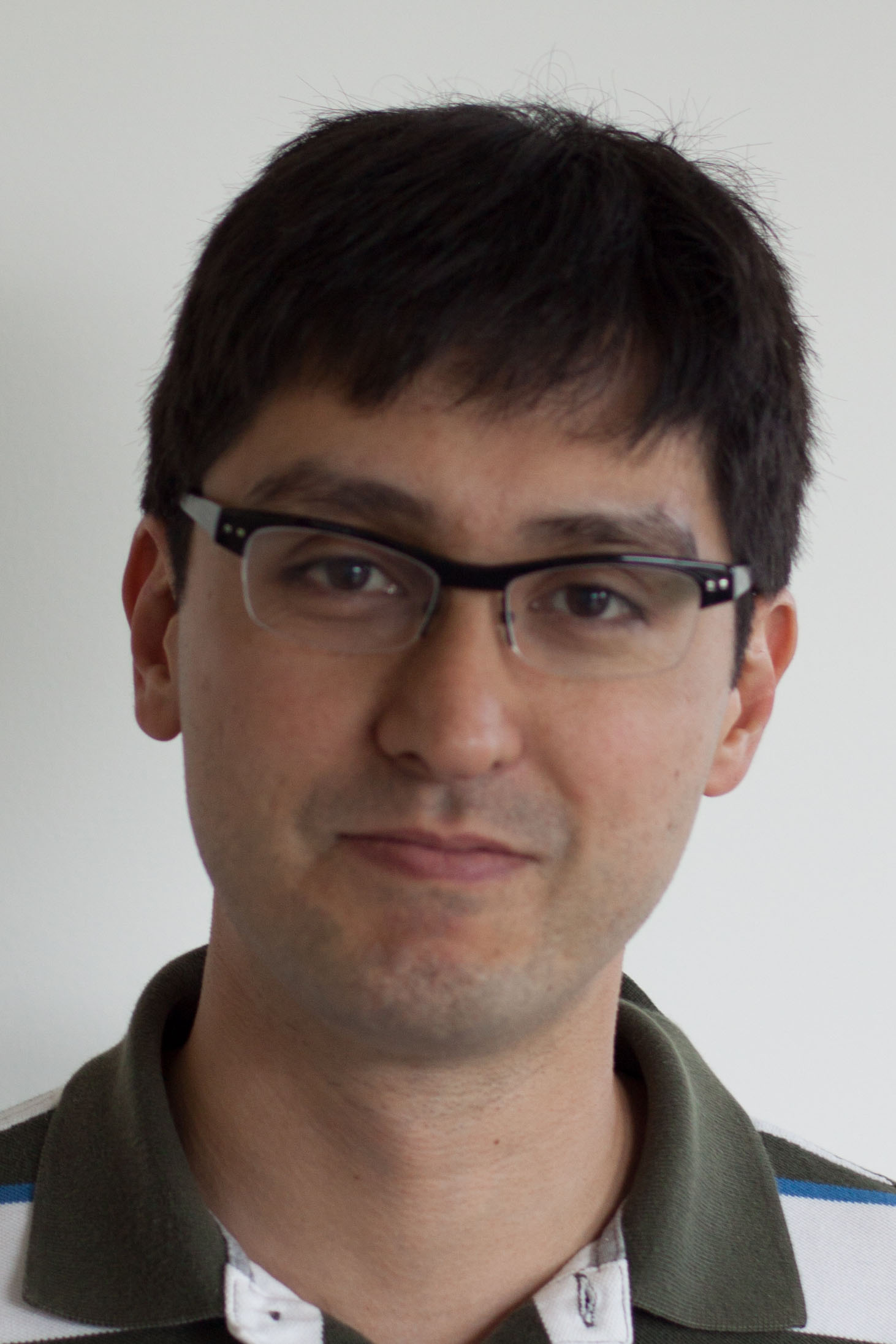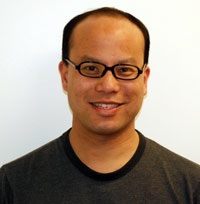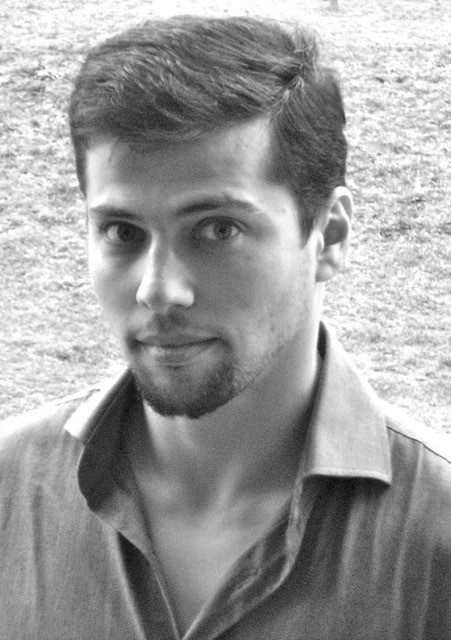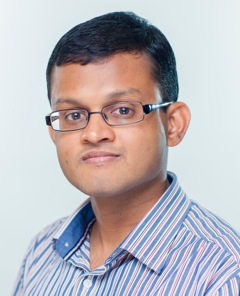Keynote Speakers:
- Marcos K. Aguilera, VMware Research, US
- Biography:
 Marcos K. Aguilera is a Senior Staff Researcher at VMware. Prior to that, he worked as a researcher at Compaq's Systems Research Center, HP Labs, and Microsoft Research Silicon Valley. His research interests include the theoretical foundations of distributed computing and the practical applications of distributed systems. He has chaired SoCC 2016, OPODIS 2014, DISC 2012, ICDCN 2011, and LADIS 2010. He currently serves on the editorial board of ACM Transactions on Computing Systems and on the program committees of ASPLOS 2019, DISC 2018, and OSDI 2018.
Marcos K. Aguilera is a Senior Staff Researcher at VMware. Prior to that, he worked as a researcher at Compaq's Systems Research Center, HP Labs, and Microsoft Research Silicon Valley. His research interests include the theoretical foundations of distributed computing and the practical applications of distributed systems. He has chaired SoCC 2016, OPODIS 2014, DISC 2012, ICDCN 2011, and LADIS 2010. He currently serves on the editorial board of ACM Transactions on Computing Systems and on the program committees of ASPLOS 2019, DISC 2018, and OSDI 2018.
- Title: Apply or perish!
- Abstract:
In this talk, I defend the thesis that computer science research is fundamentally applied—whether the work is theoretical or practical—and that research that fails to consider application will perish. To make these arguments, I draw on historical evidence and share my experience and insights of working in both theory and practice of distributed systems. I conclude with a perspective on exciting new problems and areas of application where distributed systems research will thrive in the next decade.
- Victor Luchangco, Oracle Labs, US (slides)
- Biography:
 Victor Luchangco is a theoretician by disposition and training, but he is interested in practical aspects of computing. In particular, he wants to design mechanisms that people can actually use. He is also interested in exploring how to make proofs for concurrent systems easier, both by changing how people design these systems and by using tools to aid in formal verification. As a member of the Scalable Synchronization Research Group at Oracle Labs and Sun Labs, he developed concurrent algorithms and data structures for shared-memory multiprocessors. He was also a member of the Programming Language Research Group, which designed the Fortress programming language. One focus of his work has been on transactional memory. He is the vice-chair of the group working to add support for transactional memory to C++ and was the program chair of the 2015 Workshop on Transactional Computing.
He received an Sc.D. in Computer Science from the Massachusetts Institute of Technology, with a dissertation on models for weakly consistent memories. He has authored over 50 papers and holds more than 40 patents. He has taught distributed algorithms at MIT with Nancy Lynch, and has served on the thesis committee of several students.
Victor Luchangco is a theoretician by disposition and training, but he is interested in practical aspects of computing. In particular, he wants to design mechanisms that people can actually use. He is also interested in exploring how to make proofs for concurrent systems easier, both by changing how people design these systems and by using tools to aid in formal verification. As a member of the Scalable Synchronization Research Group at Oracle Labs and Sun Labs, he developed concurrent algorithms and data structures for shared-memory multiprocessors. He was also a member of the Programming Language Research Group, which designed the Fortress programming language. One focus of his work has been on transactional memory. He is the vice-chair of the group working to add support for transactional memory to C++ and was the program chair of the 2015 Workshop on Transactional Computing.
He received an Sc.D. in Computer Science from the Massachusetts Institute of Technology, with a dissertation on models for weakly consistent memories. He has authored over 50 papers and holds more than 40 patents. He has taught distributed algorithms at MIT with Nancy Lynch, and has served on the thesis committee of several students.
- Title: Saying What You Mean
- Abstract:
Specifying a problem and its solution is often viewed as dreary work. However, identifying the essential properties of a problem, and stating them clearly, is the heart of problem solving. Careful consideration of what a problem requires often leads to a solution, and clear and precise specification is necessary to determine whether a solution is correct. Formal specification is not only the necessary basis for any formal verification, but much of the work--and the most interesting work--of verification is in writing a specification, and iteratively adjusting it until it is suitable. In this talk, I will discuss the value of good specification, both formal and informal, some of its often overlooked benefits, and challenges in doing it well (and indeed, what constitutes doing it well). I will use anecdotes, drawn mostly from my experience in developing and verifying concurrent algorithms, to illustrate both positive and negative examples.
- Miguel Matos, INESC-ID & IST, University of Lisboa, Portugal (slides)
- Biography:
 Miguel Matos is Assistant Professor at Instituto Superior Técnico, Universidade de Lisboa, Portugal and Senior Researcher at INESC-ID, in the Distributed Systems Group. His research interests lie in the area of distributed systems, in the subjects of scalability, consistency, scalability, and performance. In particular, he is conducting research in blockchain and related problems, consistency in large-scale databases, and automation and reproducibility of performance and scalability evaluations in large-scale systems. He has several publications in top journals and conferences, such as TPDS, JPDC, Eurosys, Middleware, IPDPS, and SRDS. He is currently the PI of an ongoing research project on reproducible evaluation of large-scale distributed systems funded by the Portuguese National Science Foundation (FCT). In the past, he co-founded MIMA Housing and was Senior Engineer at LeanXcale, a startup developing large-scale database solutions.
Miguel Matos is Assistant Professor at Instituto Superior Técnico, Universidade de Lisboa, Portugal and Senior Researcher at INESC-ID, in the Distributed Systems Group. His research interests lie in the area of distributed systems, in the subjects of scalability, consistency, scalability, and performance. In particular, he is conducting research in blockchain and related problems, consistency in large-scale databases, and automation and reproducibility of performance and scalability evaluations in large-scale systems. He has several publications in top journals and conferences, such as TPDS, JPDC, Eurosys, Middleware, IPDPS, and SRDS. He is currently the PI of an ongoing research project on reproducible evaluation of large-scale distributed systems funded by the Portuguese National Science Foundation (FCT). In the past, he co-founded MIMA Housing and was Senior Engineer at LeanXcale, a startup developing large-scale database solutions.
- Title: Towards reproducible evaluation of large scale distributed systems
- Abstract:
Reproducing results is nowadays one of the greatest impairments for the progress of science in general and distributed systems in particular. This stems from the increasing complexity of the systems under study, the gap between theoretical results and practical implementations, and the inherent difficulty of capturing and controlling all variables that can affect system behavior.
This talk will present a systematic approach to evaluation with two complementary goals: precisely describe the environment and variables affecting the experiment and minimize the number of variables.
- Srikumar Venugopal, IBM Research, Ireland
- Biography:
 Srikumar Venugopal is a Research Scientist in the High Performance
Systems research group in IBM Research - Ireland. He has
had 15 years of experience in investigating different problems in
distributed systems such as scheduling and resource management,
software development, co-ordination, and middleware, among others.
He has worked across both academia and industry, and has
collaborated and published with researchers from non-computer
science domains such as high-energy physics, computational finance,
and life sciences. He holds a Ph.D. in Computer Science from
the University of Melbourne, Australia (2006).
Srikumar Venugopal is a Research Scientist in the High Performance
Systems research group in IBM Research - Ireland. He has
had 15 years of experience in investigating different problems in
distributed systems such as scheduling and resource management,
software development, co-ordination, and middleware, among others.
He has worked across both academia and industry, and has
collaborated and published with researchers from non-computer
science domains such as high-energy physics, computational finance,
and life sciences. He holds a Ph.D. in Computer Science from
the University of Melbourne, Australia (2006).
- Title: Turn of the Carousel - what does edge computing change for distributed applications?
- Abstract:
Over the years, developments such as cloud computing, Internet of Things, and now edge and fog computing, have probably caused paradigm fatigue among practitioners. The question arises whether adopting a specific paradigm has a fundamental effect on the development and deployment of applications. This talk will examine this question in the context of edge computing, through the lens of developing and deploying an visual inference application.
 Marcos K. Aguilera is a Senior Staff Researcher at VMware. Prior to that, he worked as a researcher at Compaq's Systems Research Center, HP Labs, and Microsoft Research Silicon Valley. His research interests include the theoretical foundations of distributed computing and the practical applications of distributed systems. He has chaired SoCC 2016, OPODIS 2014, DISC 2012, ICDCN 2011, and LADIS 2010. He currently serves on the editorial board of ACM Transactions on Computing Systems and on the program committees of ASPLOS 2019, DISC 2018, and OSDI 2018.
Marcos K. Aguilera is a Senior Staff Researcher at VMware. Prior to that, he worked as a researcher at Compaq's Systems Research Center, HP Labs, and Microsoft Research Silicon Valley. His research interests include the theoretical foundations of distributed computing and the practical applications of distributed systems. He has chaired SoCC 2016, OPODIS 2014, DISC 2012, ICDCN 2011, and LADIS 2010. He currently serves on the editorial board of ACM Transactions on Computing Systems and on the program committees of ASPLOS 2019, DISC 2018, and OSDI 2018.
 Victor Luchangco is a theoretician by disposition and training, but he is interested in practical aspects of computing. In particular, he wants to design mechanisms that people can actually use. He is also interested in exploring how to make proofs for concurrent systems easier, both by changing how people design these systems and by using tools to aid in formal verification. As a member of the Scalable Synchronization Research Group at Oracle Labs and Sun Labs, he developed concurrent algorithms and data structures for shared-memory multiprocessors. He was also a member of the Programming Language Research Group, which designed the Fortress programming language. One focus of his work has been on transactional memory. He is the vice-chair of the group working to add support for transactional memory to C++ and was the program chair of the 2015 Workshop on Transactional Computing.
He received an Sc.D. in Computer Science from the Massachusetts Institute of Technology, with a dissertation on models for weakly consistent memories. He has authored over 50 papers and holds more than 40 patents. He has taught distributed algorithms at MIT with Nancy Lynch, and has served on the thesis committee of several students.
Victor Luchangco is a theoretician by disposition and training, but he is interested in practical aspects of computing. In particular, he wants to design mechanisms that people can actually use. He is also interested in exploring how to make proofs for concurrent systems easier, both by changing how people design these systems and by using tools to aid in formal verification. As a member of the Scalable Synchronization Research Group at Oracle Labs and Sun Labs, he developed concurrent algorithms and data structures for shared-memory multiprocessors. He was also a member of the Programming Language Research Group, which designed the Fortress programming language. One focus of his work has been on transactional memory. He is the vice-chair of the group working to add support for transactional memory to C++ and was the program chair of the 2015 Workshop on Transactional Computing.
He received an Sc.D. in Computer Science from the Massachusetts Institute of Technology, with a dissertation on models for weakly consistent memories. He has authored over 50 papers and holds more than 40 patents. He has taught distributed algorithms at MIT with Nancy Lynch, and has served on the thesis committee of several students.
 Miguel Matos is Assistant Professor at Instituto Superior Técnico, Universidade de Lisboa, Portugal and Senior Researcher at INESC-ID, in the Distributed Systems Group. His research interests lie in the area of distributed systems, in the subjects of scalability, consistency, scalability, and performance. In particular, he is conducting research in blockchain and related problems, consistency in large-scale databases, and automation and reproducibility of performance and scalability evaluations in large-scale systems. He has several publications in top journals and conferences, such as TPDS, JPDC, Eurosys, Middleware, IPDPS, and SRDS. He is currently the PI of an ongoing research project on reproducible evaluation of large-scale distributed systems funded by the Portuguese National Science Foundation (FCT). In the past, he co-founded MIMA Housing and was Senior Engineer at LeanXcale, a startup developing large-scale database solutions.
Miguel Matos is Assistant Professor at Instituto Superior Técnico, Universidade de Lisboa, Portugal and Senior Researcher at INESC-ID, in the Distributed Systems Group. His research interests lie in the area of distributed systems, in the subjects of scalability, consistency, scalability, and performance. In particular, he is conducting research in blockchain and related problems, consistency in large-scale databases, and automation and reproducibility of performance and scalability evaluations in large-scale systems. He has several publications in top journals and conferences, such as TPDS, JPDC, Eurosys, Middleware, IPDPS, and SRDS. He is currently the PI of an ongoing research project on reproducible evaluation of large-scale distributed systems funded by the Portuguese National Science Foundation (FCT). In the past, he co-founded MIMA Housing and was Senior Engineer at LeanXcale, a startup developing large-scale database solutions.
 Srikumar Venugopal is a Research Scientist in the High Performance
Systems research group in IBM Research - Ireland. He has
had 15 years of experience in investigating different problems in
distributed systems such as scheduling and resource management,
software development, co-ordination, and middleware, among others.
He has worked across both academia and industry, and has
collaborated and published with researchers from non-computer
science domains such as high-energy physics, computational finance,
and life sciences. He holds a Ph.D. in Computer Science from
the University of Melbourne, Australia (2006).
Srikumar Venugopal is a Research Scientist in the High Performance
Systems research group in IBM Research - Ireland. He has
had 15 years of experience in investigating different problems in
distributed systems such as scheduling and resource management,
software development, co-ordination, and middleware, among others.
He has worked across both academia and industry, and has
collaborated and published with researchers from non-computer
science domains such as high-energy physics, computational finance,
and life sciences. He holds a Ph.D. in Computer Science from
the University of Melbourne, Australia (2006).
